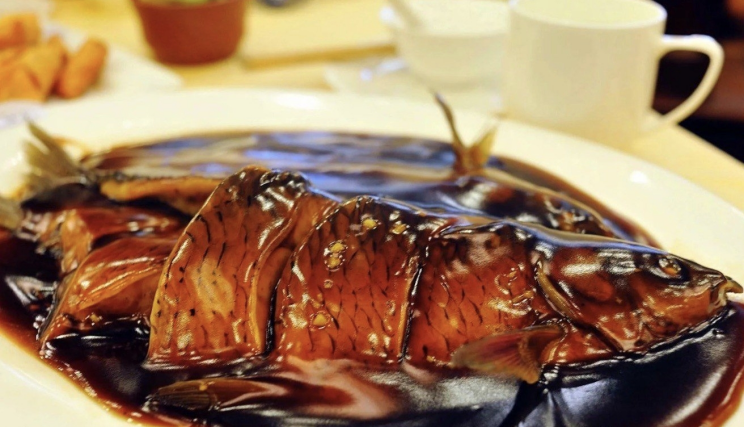Source: Zhejiang Cultural and Tourism Promotion Center for Hong Kong and Macao

In Zhejiang, culinary delights transcend mere taste – they are cultural dialogues that bridge time and space. From the vibrant street food of the Beijing-Hangzhou Grand Canal to the lake delicacies of Qiandao Lake, and the authentic flavors of East China Sea fishing ports, every dish carries millennia of local heritage. Let us embark on a culinary pilgrimage through Zhejiang's flavors, tracing the trail of taste to discover its timeless essence.
A thousand years of fireworks along the canal
At dawn by Hangzhou's Gongchen Bridge, the kitchens of Yunhe Renjia restaurants exude the authentic aroma of West Lake Vinegar Fish. This Hangzhou culinary masterpiece, originating from the Southern Song Dynasty, features West Lake grass carp marinated with vinegar, sugar, and wine. Its vibrant red hue and perfectly balanced sweet-sour flavor mirror the character of Jiangnan people—gentle yet spirited. As recorded in the Qing Dynasty's "Suiyuan Shidan": "For vinegar-braised fish, slice live grass carp into large pieces, sauté in oil, then season with soy sauce, vinegar, and wine," which precisely describes this dish's predecessor.
As you journey downstream along the canal, the December charm of Shaoxing's Anchang Ancient Town blossoms on your palate. Established in 1892 during the Guangxu reign of the Qing Dynasty, Renchang Soy Sauce Garden still employs traditional techniques to craft soy sauce. Strolling through the ancient town's cobblestone streets, cured sausages, soy sauce ducks, and dried fish sway beneath the eaves, their aroma carrying the essence of time. Sitting in an oiled black boat, sipping a pot of Shaoxing yellow wine with a plate of fennel beans—this is the authentic hometown flavor described by Lu Xun.
The generous gifts of the mountains and lakes
In the autumn glow of Nanxun's ancient town, the aroma of xun ti (pig trotters) lingers through the twilight of Baijianlou. This Ming Dynasty culinary artistry features Taihu Lake pork trotters simmered over low heat for over three hours with Nanxun's signature soy sauce and rock sugar. The meat remains tender yet retains its shape, while the broth becomes rich without being greasy—a perfect embodiment of the highest hospitality tradition in Jiangnan.
In the deep waters of Qiandao Lake, organic bighead carp thrive in pristine waters. Local chefs adhere to the "Three No's" principle for fish heads: no gills removed, no pickling, no oil frying. Using only mountain spring water and simple seasonings, they create a creamy white fish head soup. This dish, listed as Zhejiang's Intangible Cultural Heritage, perfectly embodies the culinary philosophy that "true flavor requires simplicity."
The ultimate flavor of meeting mountains and seas
In the early morning of Guci City, Jinhua, the rich aroma of ham awakens the entire city. Xuefang Jiang Ham, established in 1919, strictly adheres to the ancient method of "winter curing, spring sun-drying, and summer maturation." A qualified ham requires over 80 processing steps and takes three years to complete. The Qing Dynasty's *Supplement to Compendium of Materia Medica* praised it as "beneficial for kidneys, nourishing the stomach, promoting saliva production, and enhancing vitality." This time-honored delicacy, embodying the wisdom of generations, has long transcended the mere significance of its ingredients.
At a street stall beneath Yandang Mountain, dried noodles stir-fried with seafood dance in a cast-iron wok. This seemingly ordinary street snack hides culinary magic: razor clams from Yueqing Bay, Dongtou shrimp, and locally sourced free-range eggs paired with noodles made from Yandang Mountain spring water create a perfect fusion of mountain and sea flavors. As the ancient text *Lüshi Chunqiu* states in its *Benwei Chapter*: "Water is the origin of all flavors," this dish stands as a living testament to Zhejiang's harmonious blend of mountain and coastal terroir.
Seasonal taste memories
September brings the vibrant Fishery Festival to Xiangshan Shipu Port. At the pier, freshly caught ribbon fish shimmer in silver, while swimming crabs stretch their claws in lively displays. Adhering to the "catch and cook immediately" tradition, the locals prepare a hearty soup of pickled vegetables and yellow croaker that perfectly captures the essence of the East Sea. This dish, originating from Zhoushan's fishing community, uses pickled Chinese mustard greens to accentuate the fish's natural sweetness. The creamy white broth and tender fish meat make this culinary masterpiece a generous gift from the ocean to its industrious creators.
In winter, the shores of Taihu Lake in Huzhou are in the prime season for hairy crabs. The unique climate of South Taihu waters has nurtured premium crabs with green backs, white bellies, golden claws, and golden fur. Locals pair these delicacies with aged huadiao wine and ginger vinegar—a combination that both dispels the cold and enhances the flavor. This time-honored culinary wisdom, perfectly aligned with nature's rhythms, vividly embodies the ancient concept of "seasonal preparation" from the Yellow Emperor's Inner Canon, now living through local traditions.
At Zhejiang's dining tables, each dish is a vivid chronicle of local history, and every bite becomes a dialogue with the past. These culinary delights not only nourish the body but also preserve a cultural legacy that has endured for millennia. When the aroma of food lingers on your palate, you'll discover that the most touching stories often lie hidden in the ordinary warmth of daily life.


